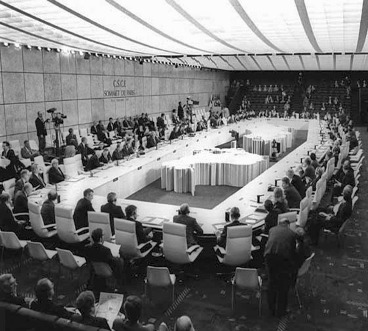The Organization for Security and Cooperation in Europe (OSCE) promotes a strong and vibrant transatlantic relationship and fosters a peaceful and prosperous European continent. Slovakia, which holds the 2019 OSCE chairmanship, considers energy security a priority for what the OSCE terms the second dimension, the economic and environmental portfolio. In addition, Helsinki Commission Chairman Alcee Hastings has identified principled foreign policy—including the sustainable management of resources; battling corruption; and protecting the fundamental freedoms of all people—as a priority for the commission during the 116th Congress.
At this briefing, the Helsinki Commission invited panelists to discuss the potential use of energy, specifically oil and gas projects, to achieve foreign policy goals, as well as the extent to which energy independence can reduce the ability of hostile actors to destabilize the region by threatening to cut off access to energy supplies. Experts weighed in on the nuances behind pipeline politics in Europe against the background of the current state of oil and gas markets, alongside strategic differences among European nations and between the European Union (EU) as an entity vs. its Member States. Panelists also discussed the ability of the United States to influence European pipeline politics, particularly given concerns raised regarding Russia’s Nord Stream 2 gas pipeline in the wake of Russian aggression in Ukraine.
Senior Associate at the Center for Strategic and International Studies and noted energy expert Ed Chow emphasized that “mega” pipelines are expensive projects that cost billions of dollars and take at least three to five years to complete if everything goes well.
Although such projects may be examined later from a foreign policy perspective, they have long-planned commercial justifications: pipelines are sponsored by oil and gas producers who seek to bring their product to market in the most efficient way possible. In many countries, governments may subsidize or invest in pipelines as public infrastructure. Nevertheless, unless the government is willing to bear the full financial risk, these projects require financially committed shippers of oil and gas, and a bankable market or creditworthy buyers at the end of the pipe.
Chow noted that in Washington, analysts often debate whether certain projects are economically viable or politically motivated, but that the pertinent test is whether projects are bankable or not. If they are bankable, they will be built. If they are not bankable, they won’t.
Colin Cleary, Director for Energy Diplomacy for Europe, Western Hemisphere and Africa, U.S. Department of State, highlighted America’s longstanding commitment to European energy security based on deep political, economic, cultural, and historical ties. He stated that the United States is invested in Europe’s political and economic welfare and stability, including its energy security. He noted that Europe relies significantly on Russia to meet its energy needs and that Russia has demonstrated its willingness to use energy as a geopolitical tool.
Cleary also observed that the United States considers Russia’s Nord Stream 2 and the TurkStream pipelines as fundamentally political, rather than commercial, projects. By bypassing Ukraine, the pipelines will destabilize Ukraine economically and strategically—depriving the country of an estimated $3 billion a year in gas transit revenue—and to punish Ukraine for choosing to step outside of Moscow’s geopolitical orbit. He noted that all countries that are highly dependent on Russia for energy are vulnerable to Russian political and economic pressure. He emphasized later that the United States is not alone in opposing Nord Stream 2.
In response, Cleary suggested pursuing diversification through liquified natural gas (LNG), nuclear energy, and renewable sources. He noted that the United States supports the European Union’s projects of common interest, such as greater interconnection in the European gas transit system, LNG hookups, and initiatives like Baltic Pipe, which is designed to channel Norwegian gas to Poland and the Southern Gas Corridor.
Atlantic Council Senior Fellow David Koranyi emphasized that the state of energy independence in many European countries has improved greatly in the last decade. He noted that his home country of Hungary has about 6.3 billion cubic meters of gas storage facility, and that capacity is growing. While noting the dangers of both Nord Stream 2 and TurkStream, he also observed that the current negative rhetoric from Washington against these projects is unhelpful. Instead, the focus should be on what can be done in cooperation with European allies. For example, the Three Seas Initiative, which Congress is considering funding, would be a positive forum for strengthening cooperation.
Koranyi also pointed to projects such as the Krk LNG terminal in Croatia as a way to build the infrastructure needed for greater diversification. He cautioned against putting too much hope in the East Mediterranean becoming a major source of natural gas to Europe any time soon, as the region faces its own geopolitical and economic challenges.
Efgan Nifti, Director of the Caspian Policy Center, discussed the Southern Gas Corridor, stretching from the Caspian Sea to Western Europe, which has been a major focus of U.S. energy policy in Europe and Eurasia since the 1990s. He stated that the Southern Gas Corridor, often called the fourth energy corridor for Europe, is materializing rapidly. Gas already is being delivered to Turkey through the South Caucasus Gas Pipeline, with the Trans Adriatic and Trans Anatolian Pipelines soon to follow.







